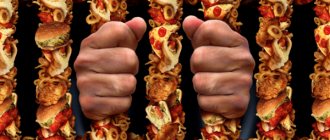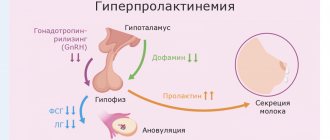Content:
- Types of disorders associated with uncontrolled eating
- Causes of the disease
- Treatment of compulsive overeating
- How to fight on your own 4.1. How to treat
- Consequences
Some people tend to cope with stressful situations or bad moods through food. Over time, food becomes an exclusive source of satisfaction, resulting in compulsive overeating or bulimia. Eating disorders cannot be ignored; over time, they negatively affect physical health and psychological well-being.
Compulsive overeating: how to stop eating stress
Why for many people, snacking is the most reliable way to cope with negative emotions and how to change this pattern of behavior without subjecting yourself to strict control and self-criticism. We talked about this with psychologists from the YouTalk service.
Food addiction can have several causes:
low level of self-regulation of the satiety-hunger balance
an acquired way of coping with life situations
physiological characteristics of the body
habits formed in childhood
the additional meaning that food carries (as a component of communication, a connection with another person, as a guarantor of safety, and so on)
Snacking affects the emotional state of different people differently. It can become a way to “escape” from difficult emotions (I’m sad - I’ll go eat candy or a cutlet), calm, and an opportunity to relax and have fun. For others, food is just food. It does not carry any additional emotional burden.
There are common cases where eating becomes a universal and accessible way to reduce anxiety, although the person may not be directly aware of it. He just feels good from the portion he eats. In such cases, you need to understand in detail what or who the anxiety is associated with. Often we are talking about the loss of an emotional connection or the impossibility of this connection with a loved one.
The trigger can be an event or a subjective interpretation of an event that is closely related to the cause of anxiety: for example, again there is no call from a loved one, loneliness, boredom, and so on.
It’s more difficult to talk about a physiological predisposition to compulsive overeating—here experts’ opinions differ. Most often, the tendency to overeat develops throughout life if “go and eat to feel lighter and calmer” becomes the basic or only way to respond to a stressful situation.
Eating disorders and binge eating disorder have long been considered predominantly female diseases, but recent data shows that 20-30% of people with eating disorders are men (although this number is considered an underestimate). It’s just that women more often monitor their eating behavior, try to control it, and notice compulsive overeating. Men are less likely than women to adhere to a restrictive diet (29.8% and 57.3%, respectively). They may view their compulsive overeating as a normal stress response that is not worth addressing.
In addition, women are more likely to seek help and talk about their problems, and among men this can be considered a sign of weakness.
The difference between hunger and the desire to “eat” stress
The desire to “eat” emotions, as a rule, is not accompanied by real hunger. The latter can be satisfied with food, but emotional overeating is very difficult to control, since you want more and more.
During such a period, a person eats more than he needs to feel full, and after some time he feels discomfort. Until this signal from the body, it cannot stop. Most often, emotionally overeating people eat very quickly, as if they are afraid that someone will take the food, and alone. Then they feel guilty and self-loathing.
Emotional overeating can be different: for example, cravings for sweets, fast food or any other food. Key sign: there is no hunger as such, but there is a desire to experience a difficult emotion. Often, people with eating disorders experience impaired perception: hunger may not be felt at all until the body begins to weaken, or it may be felt when the body does not need food.
Why is compulsive overeating dangerous?
Binge eating disorder is a mental disorder. Unproductive ways of coping with stress prevent a person from adapting to difficult situations and make life difficult. It is common for people with an eating disorder to have or develop anxiety disorders and depression.
From the point of view of the physiological effect on the body, the same symptoms can be identified as with normal overeating: bloating, pain, heartburn, nausea. Long-term problems also arise: deterioration of skin condition, weight gain, risk of developing various gastrointestinal and cardiovascular diseases, and diabetes. It is important to note that the consequences are influenced by the frequency of compulsive overeating, metabolic characteristics and existing predispositions. Most people with compulsive overeating disorder are of a relatively normal weight.
How to identify the source of negative emotions
Doing this on your own is quite difficult. You can try asking yourself the following questions during periods of anxiety:
what's happening to me now?
what I feel?
How could I help myself?
what do I need now?
What do I really want now?
What are the ways to get what you want?
What can I do in this situation, and what can I really not change?
If you find it difficult to understand your feelings, you can start writing down situations in which you overeat: quarreled with your partner, received criticism from your boss, thought about the mountain of things to do for tomorrow, and so on. And after a while, look at the records and try to find patterns.
You can tell a loved one about your experiences and emotions. Their reasons are often clearer when you start talking about them.
Independent methods of working with eating disorders
The more tightly you try to control your eating behavior, the higher your risk of developing this disorder.
Think of stress as a wound and binge eating as a pain reliever. It reduces pain, but it only works for a short time, has side effects, and does not address the cause. But if you just leave an open wound, there is a risk of getting an infection and it will only get worse. Undoubtedly, it is better to choose a healing ointment or medicine that is suitable for you after a medical examination.
Buying ointment yourself is the first step. Start tracking situations when you experience fear or anxiety and feel the urge to eat this state. Then try other ways to cope with stress: talk about what is happening with a loved one, do something that brings you pleasure, distract yourself with other things, or deal with the source of your anxiety, if possible. The more productive methods you have, the less you will “eat” negative emotions.
You can track the days you overeat. For example, using a habit tracker. At the same time, a careful attitude is very important: do not scold yourself in those cases when you could not cope with your feelings and ate the cake alone.
There is no need to keep a food diary without the support of a psychologist if you notice signs of an eating disorder: it can bring both benefit and harm.
Sometimes you can cope with compulsive overeating on your own, but even if the help of a specialist is not necessary, it will help you achieve the desired result faster and safer.
Eating control can negatively influence the course of an eating disorder. Therefore, each person needs an individual approach. A consultation with a psychotherapist, a medical examination and the development of an individual plan are required. For example, a person with diabetes and a patient with other hormonal problems may have different nutrition plans.
In the first stages of working with compulsive overeating, you can always have healthy (or simply not harmful) snacks that you like on hand. You won't stop stress eating overnight—overeating may happen for a while, and that's normal. But you can choose foods that will cause less harm to your body.
Try to explore your own ways of getting pleasant emotions. Can anything besides food make you happy? Or is food the only source of pleasure? You can always find a healthier alternative: sports, communication, meditation and relaxation, a pleasant pastime. But if your hand is already reaching for ice cream or chocolate, stop for a second and ask yourself: “What is happening to me now?”
When to see a doctor
It is necessary to consult a psychiatrist if overeating becomes uncontrollable, that is, a lot can be eaten in a short period of time, and the anxiety associated with overeating goes off scale.
You will likely be prescribed anti-anxiety medications and referred to psychotherapy. Treatment methods will depend on the approach in which the specialist works.
For example, as part of cognitive behavioral psychotherapy, you will be asked to monitor situations, your thoughts and emotions when the desire to “eat” stress arises. The therapist will help you look at situations from different angles, change your perception of them, and learn to find other ways to relax besides food.
The Gestalt approach has a method that views emotional eating as a consequence of a process of change in a person's relationship with a significant other. The work is built around the restoration of this process, and it occurs within a person’s perception of these relationships.
The result will depend on what request you make to a psychotherapist: sometimes you just want to change behavior patterns, and sometimes you want to get to the root of the problem and solve it. It all depends on you and your agreements. The duration also depends on the request and the severity of the condition. Long-term therapy brings the most stable and reliable results - 40 sessions or more.
Preventing emotional eating
Most aspects of eating behavior develop as we grow older and are influenced by many different factors. Therefore, the best prevention of compulsive overeating is a healthy relationship with food and your own body from childhood.
It's important to understand which foods you like and which you don't. Listen to the feeling of hunger and satisfy it as much as the body needs, without forcing yourself to eat more or less. Don't use food as a reward: if you behave well, you'll get candy. That is, many habits and attitudes towards food are established in the family.
The second part of prevention is developing productive ways of coping with stress. There are many of them, and there is something different for each situation: seeking social support, planning, acceptance, positive reframing, and so on.
Habits that help cope with stress better than food:
share with a loved one what is happening to you
communication and improving the quality of communication
sports and other physical activity
meditation and relaxation
Think carefully about what helps you maintain inner balance, or contact a specialist if you cannot solve the problem yourself.
Types of disorders associated with uncontrolled eating
Binge eating disorder is uncontrollable episodes of eating large meals that are not accompanied by cleansing procedures. We can talk about the presence of this disorder if episodes are repeated approximately 3 times a week for 3 months.
Symptoms:
- food consumption stops at the moment when a person experiences physical discomfort;
- in most cases, a person eats completely alone;
- the person eats faster than usual;
- after eating, self-loathing, depression and guilt appear;
- a person eats even if he is not hungry.
Bulimia is regularly recurring episodes of uncontrolled eating followed by compensatory behavior (cleansing the gastrointestinal tract, fasting, increased physical activity). Losing control over the amount of food eaten leads to feelings of guilt and fear associated with weight gain. During one attack, the patient can consume about 6000 kcal. It is worth noting that bulimia occurs 2-3 times more often than anorexia. The majority of patients are women aged 15-25 years.
Symptoms:
- uncontrolled eating of large portions in a short period of time;
- diets alternating with bouts of overeating;
- the patient eats alone;
- inducing vomiting;
- intensive training;
- low self-esteem;
- sudden mood swings;
- obsession with appearance and body weight;
- weakness;
- withdrawal from family members, friends and colleagues.
The main difference between bulimia and compulsive overeating is purging, fasting and increased physical activity in the first type of disorder.
3. Lack of maternal warmth and attention
For a baby, maternal warmth - literally peace, satiety and love or tenderness of the mother is synthesized into a state of nirvana - an indescribable state to which we unconsciously strive throughout our lives. And only our mother can give it to us in infancy. And if the mother cannot, for various reasons, provide as much “nirvana” as the child needs, a state of severe psychophysical dissonance arises, which is felt by the person throughout his entire adult life. And the reasons may be: · Illness, depression of the mother. · Difficult life situation. · Difficult living conditions. · The mother’s concern for the health of other family members or the older child. · The need to go to work, etc. · “Rejecting” mother, etc.
As an adult, a person “unconsciously seeks” this missed intimacy and often finds it in food. And, if he is not able to provide himself with peace, warmth and tenderness, then he can provide himself with satiety. The neurotic thirst for love and warmth is insatiable. The same is true with food - no matter how much he fills himself with food, the feeling of emptiness remains. Subsequently, overeating becomes its defining feature. There is only one way out in this situation - to learn to take care of your “inner child”, to become a caring, loving parent for yourself. This is the only way to resolve issues related to overcoming food addiction.
Causes of the disease
Most often, eating disorders develop in adolescence, when experiments with diets begin. Restrictions lead to the opposite result - excessive food consumption and weight gain.
The cause of compulsive overeating in adolescents can be parental diets or the transmission of values about low weight, as well as depression or stress.
The causes of increased appetite may be physiological factors: genetic predisposition or dysfunction of the hypothalamus.
Causes of the problem
Psychogenic overeating is associated with internal and external factors. It is impossible to reliably name the cause of the disorder, but it is known that the trigger may be one or more of the following reasons:
- genetic predisposition, namely the presence of close relatives with a history of obesity or any eating disorder;
- acute or chronic stress (problems at work, school, frequent conflicts in family, friends);
- uncontrollable hunger, following strict diets for an extended period of time;
- dissatisfaction with one's own body;
- emotional instability;
- the presence of endocrine diseases, obesity;
- depressive disorders;
- postoperative recovery.
Get help now
Do any of your relatives or friends have an addiction? Have you tried in every possible way to help, but as a result the person still returned to his past life?
You are not the first to encounter this problem, and we can help you.
We guarantee anonymity, we will persuade you to undergo treatment, and we will help you choose a center.
Call us
+7
or
Call me
Treatment of compulsive overeating
At the initial stages of the disease, others do not notice changes in the patient’s behavior. Only if a person himself admits the presence of problems will he be able to find the answer to the question: how to overcome compulsive overeating. The sooner you can identify the causes and begin treatment, the higher the likelihood of a complete cure.
How to fight on your own
First you need to acknowledge the problem. Start looking for the true reasons; usually, people eat stress, anxiety, and tension. It is necessary to learn to distinguish physiological hunger from psychological, and also to abandon food prohibitions. Diets and dietary restrictions, in most cases, are the causes of the development of the disease.
How to treat
But what should those who cannot find the strength to cope with the disease do? Of course, look for a competent psychotherapist who will help you find the true cause, eliminate it and get rid of compulsive overeating.
The treatment method is selected depending on the severity of the patient’s condition. The following psychotherapeutic methods have proven effectiveness:
- Cognitive behavioral therapy allows you to determine the root cause of the disease, so that the specialist can choose the right treatment tactics.
- Dialectical behavior therapy is aimed at finding new ways to deal with stressful situations, teaching emotional regulation techniques that are not related to eating or refusing food. Completion of treatment is accompanied by the abandonment of extreme methods of dealing with stress and strict diets.
- Family psychological therapy has a positive effect. During treatment, the specialist helps to develop adaptive tactics, create the correct model of behavior, and provides support to the patient’s family members.
Causes and symptoms of compulsive overeating
The causes of eating disorders vary.
Physiological:
- food is a source of pleasure;
- individual characteristics of the body;
- genetic predisposition;
- the presence of various diseases;
- dependence on certain foods.
Social:
- modern food technologies using synthetic additives and flavor enhancers have become an integral part of food production and contribute to more food consumption than is necessary to maintain life support;
- social inequality of different segments of the population (low-income families eat cheap, so-called conditionally edible products, replete with substitutes, food additives, taste enhancers);
- the formation of unhealthy eating behavior in the family using the experience of the older generation (the cult of food among people who have experienced famine or have national traditions of long feasts; encouragement with food; large portions of food and a large number of meals);
- the influence of the information space, replete with culinary master classes, advertising of food and various restaurants;
- various shows demonstrating body beauty standards, a huge number of diets and fitness clubs to achieve the cherished parameters. Because of this, the neuroticism of people who have an eating disorder and whose body parameters do not correspond to accepted standards of beauty intensifies;
- a dense network of fast food establishments offering a variety of dishes and drinks rich in nutritional supplements and flavor enhancers.
Psychological:
- depression, stress, emotional trauma;
- increased demands on oneself;
- inconsistency with generally accepted standards, which generates hatred of one’s own body;
- loneliness.
There can be several causes of an eating disorder, but physiological ones are not as common as is commonly thought. For most people suffering from compulsive overeating, psychological causes are predominant.
Compulsive overeating is characterized by the following symptoms:
- eating in the absence of hunger;
- quickly eating abnormally large amounts of food;
- uncontrolled overeating in a state of distress;
- weakening of the volitional sphere;
- feeling of guilt during and after overeating, self-flagellation;
- excessive physical activity and strict diets after overeating;
- overeating alone;
- weight gain, turning into obesity.
Consequences
Delayed treatment and its absence can lead to negative consequences.
Possible complications:
- development of cardiovascular disease;
- obesity;
- development of a depressive state;
- drug or alcohol addiction;
- diabetes;
- changes in blood pressure;
- metabolic disorders;
- diseases of the gastrointestinal tract;
- development of certain types of cancer;
- increased cholesterol levels;
- osteoarthritis;
- apnea.
Bulimia due to regular induction of vomiting or intestinal lavage is accompanied by disturbances in the functioning of the gastrointestinal tract. Due to the fact that some patients take diuretics, their body may become dehydrated.
It is worth noting that people suffering from bulimia and compulsive overeating disorder look different. The former are slim, the latter are overweight, which increases over the years.
Uncontrolled eating can lead to severe consequences. The patient experiences emotional dissatisfaction, which contributes to the development of depression and can cause suicidal thoughts. The whole body suffers from uncontrolled eating. If you contact a qualified specialist in a timely manner, there is a high probability of successful treatment and full recovery.
Treatment
How to get rid of compulsive overeating is a question that faces everyone who is faced with this disease. Therapy for eating disorders is carried out simultaneously in two directions, since the pathology includes both physiological and psychological factors.
First of all, compulsive overeating promotes weight gain (often leading to obesity), as a result of which the patient’s metabolism is disrupted, metabolic syndrome slows down, a load is placed on all internal organs, and fatty hepatosis develops. To eliminate the cause of increased appetite, it is necessary to reduce the patient’s anxiety and lift him out of a depressive state. A psychotherapist will help with this using various psychotherapeutic techniques.
Psychotherapy
Modern methods of treating compulsive overeating for older people are selected depending on their condition and individual characteristics. The effectiveness of each method has been proven through numerous studies and is recommended for patients of all ages.
For treatment it is used:
- Cognitive behavioral therapy. The basis of this method is the psychological impact on a person’s thoughts. After just a few sessions of this therapy, a patient suffering from compulsive overeating disorder controls his actions, sets goals and independently overcomes stress.
- Group psychotherapy. If the cause of an eating disorder is social in nature, then treatment is prescribed in groups, where the person understands that he is not the only one facing such a problem and learns communication skills without hesitation.
- Hypnotherapy. Often, indigestion is associated with psychosomatics, which contributes to the occurrence of various diseases, for example: hypertension, gastrointestinal diseases, insomnia (insomnia). Unlike other psychotherapeutic techniques, hypnotherapy guarantees a speedy recovery. In the process of hypnotic influence on the psyche, a person recovers after 3-4 sessions and returns to normal life.
Treatment of compulsive overeating disorder is a long process and usually takes from three months to a year. Therefore, it is important to be patient and strictly follow the doctor’s recommendations.
Nutrition
For compulsive eating disorders, it is important to organize proper nutrition, as this is an integral part of therapy. Treatment of pathology is carried out on an outpatient basis, which means that the patient himself takes responsibility for the result.
Due to the fact that the main cause of the disease is psychological, the help of loved ones is often required. This will help you strictly control portion sizes, control your meal schedule and daily routine.
In addition, it is very important to learn:
- Distinguish biological hunger from psychological and satisfy only the first.
- Eat low-calorie foods and reduce portions.
- Avoid going to cafes and restaurants (during treatment).
- Give preference to protein and plant foods.
- Avoid watching cooking TV shows and talking about cooking.
- Find a way to switch attention (hobbies, reading books, dancing, doing yoga, watching movies, etc.).
- Create a menu for the week that includes three meals per day.
It is also not recommended to adhere to a diet and ban the consumption of your favorite foods. So, one piece of your favorite cake a week or a pack of chips will not harm your health and will help you tolerate dietary restrictions more easily.
If you have difficulty choosing a menu, you should contact a nutritionist who will develop an individual diet taking into account your condition, existing chronic diseases and eating habits. This will contribute to a faster recovery and return to normal life.
Literature:
- Bulimia. Food or life: How to get rid of food addiction / Kulchinskaya, Irina Vladimirovna. - Moscow: Binom, 2013. - 255 p.
- Bulimia Therapy: Using Dialectical Behavior Therapy to Interrupt the Bulimic Cycle and Regain Control of Life / Ellen Astrachan-Fletcher, Michael Maslar; translation from English and editing by M. B. Smologub. — Moscow: Dialectics; St. Petersburg: Dialectics, 2021. - 284 p.
- Getting rid of food addiction: how to cope with uncontrollable cravings for food, relieve stress and stop hating your body: workshop / Carolyn Cocker Ross; [translation from English by Natalia Buravova]. — St. Petersburg: Ves, 2021. — 272 p.











